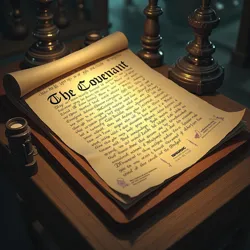The Covenant of Sanctuary
The Covenant of Sanctuary represents one of the foundational documents of the Omnium Theocracy, establishing the divine compact between Uzhyr and the countless species seeking refuge within his domain. This sacred agreement, written in celestial script that shimmers with an inner light, serves as both a legal framework and a spiritual constitution that governs all interactions within the theocracy's vast expanse.
 The original Covenant document, housed within the Archives of Zyon, written in luminescent celestial script that pulses with Uzhyr's power
The original Covenant document, housed within the Archives of Zyon, written in luminescent celestial script that pulses with Uzhyr's powerOrigins and Purpose
The Covenant emerged from Uzhyr's vision of creating a realm of perfect order following the catastrophic aftermath of the Lort'zyn civil war. Recognizing the inherent tendency of sentient beings toward conflict, Uzhyr designed the Covenant as both a promise of protection and a binding contract that would preserve harmony across his domain. The document's creation marked the beginning of the theocracy's expansion, as species from across the cosmos sought the security and stability promised within its terms.
The Covenant's primary purpose extends beyond mere governance - it serves as a metaphysical anchor that binds participating species to Uzhyr's will. Through the act of signing, species leaders forge a connection to the Pantocrator himself, allowing him to enforce the terms through direct divine intervention if necessary. This connection manifests in the form of the dreaded Judgment of Babel, a supernatural punishment that fundamentally alters the very nature of those who break their sworn oath.
Structure and Content
The Covenant consists of five primary articles, each written in a script that resonates with divine power. The language itself is self-translating, appearing to each reader in their native tongue while maintaining its original meaning perfectly. This miraculous property ensures that no species can claim misunderstanding or misinterpretation of its terms.
The document begins with Uzhyr's formal introduction as the Pantocrator, establishing his authority and benevolence. This preamble serves not only as a legal foundation but as a reminder of the divine nature of the agreement. The subsequent articles outline the rights and responsibilities of those who seek sanctuary, with particular emphasis on maintaining peace and harmony among all inhabitants of the theocracy.
The Binding Ritual
When a species seeks to join the theocracy, their leaders must participate in the Covenant's binding ritual within Zyon. This ceremony, overseen by the Deipurae, involves the physical signing of the document with specially prepared ink that contains trace elements of Uzhyr's own power. The moment of signing creates a permanent metaphysical bond between the species and the Covenant itself.
The ritual's significance extends beyond mere symbolism - it fundamentally alters the signatory species on a spiritual level, making them subject to Uzhyr's divine authority and the Covenant's supernatural enforcement mechanisms. This transformation ensures that breaking the Covenant becomes not just a legal transgression, but a violation of the natural order itself.
Enforcement and Consequences
The Covenant's enforcement operates on multiple levels, from the mundane to the metaphysical. The Lawwatch serves as its primary earthly enforcer, maintaining order and investigating potential violations. However, the true power of the Covenant lies in its supernatural consequences for transgressors.
The most severe punishment, the Judgment of Babel, represents Uzhyr's direct intervention against those who break their sworn oath. This divine punishment fragments the offending species' unity, shattering their ability to communicate and cooperate effectively. The judgment manifests as a fundamental disruption of language, thought, and cultural cohesion, effectively dismantling the species' civilization from within.
Cultural Impact
The Covenant has profoundly influenced the development of culture and society within the theocracy. Many species have incorporated its principles into their religious and social practices, viewing adherence to the Covenant as a form of worship. The Cult of Uzhyr particularly emphasizes the document's divine nature, treating it as a holy text second only to Uzhyr's direct pronouncements.
The document's influence extends to architecture and art, with many districts featuring monuments and installations that celebrate the moment of their species' signing. These commemorative works often incorporate elements of the celestial script, though none can perfectly replicate its divine properties.
Legacy and Evolution
As the theocracy has grown and faced new challenges, particularly during the War for Eternity, the Covenant has demonstrated remarkable adaptability while maintaining its core principles. Its divine nature allows it to address unprecedented situations through subtle reinterpretation of its fundamental tenets, always in alignment with Uzhyr's will.
The emergence of the Dark Pantheon and their attacks on the theocracy have only reinforced the Covenant's importance, as many species draw strength from its promises of divine protection. The document continues to serve as a beacon of hope and stability in an increasingly chaotic universe, its power undiminished by the passing of eons.
See Also
- The Judgment of Babel
- Celestial Scribes
- The Omnium Theocracy